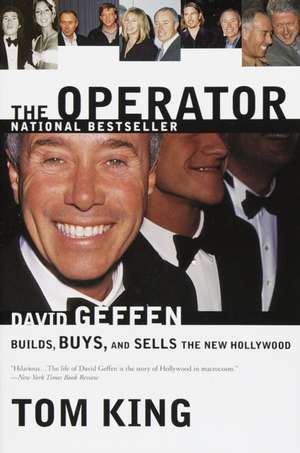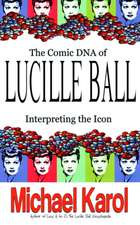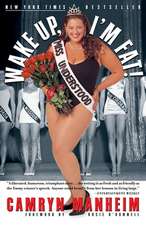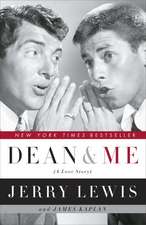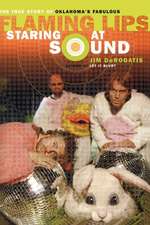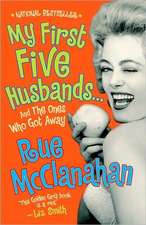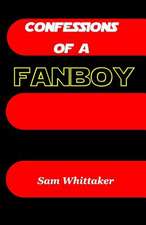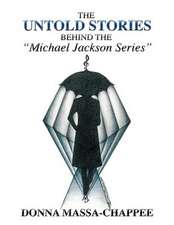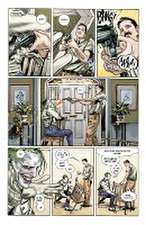The Operator: David Geffen Builds, Buys, and Sells the New Hollywood
Autor Tom Kingen Limba Engleză Paperback – 31 mai 2001
Complex, contentious, and blessed with the perfect-pitch ability to find the next big talent, David Geffen has shaped American popular culture and transformed the way Hollywood does business. His dazzling career has included the roles of power agent, record-industry mogul, Broadway producer, and billionaire Hollywood studio founder–but from the beginning his accomplishments have been shadowed by the ruthlessness with which he has pursued fame, money, and power. With The Operator, Tom King–who interviewed Geffen for the book and had unimpeded access to his circle of intimates–presents a mesmerizing chronicle of Geffen’s meteoric rise from the mailroom at William Morris, as well as a captivating tour of thirty sizzling years of Hollywood history. Drawing on the recollections of celebrities such as Tom Cruise, Yoko Ono, Warren Beatty, Courtney Love, Paul Simon, and even Cher (whom Geffen nearly married), The Operator transports readers to a world that is as ruthless as it is dazzling, revealing a great American story about success and the bargains made for it.
“A detailed portrait of Hollywood’s premier manipulator…The Operator is as much a composite portrait of the ‘New Hollywood’ as it is of the fifty-seven-year-old partner in DreamWorks SKG.” –San Francisco Chronicle
“Illuminating...[The Operator] shows how raging ambition and chutzpah are as much valued as talent–or more so–in determining success.” –Philadelphia Inquirer
Preț: 214.50 lei
Nou
Puncte Express: 322
Preț estimativ în valută:
41.05€ • 44.57$ • 34.48£
41.05€ • 44.57$ • 34.48£
Carte disponibilă
Livrare economică 01-15 aprilie
Preluare comenzi: 021 569.72.76
Specificații
ISBN-13: 9780767907576
ISBN-10: 0767907574
Pagini: 688
Ilustrații: BLACKWHITE PHOTOS THROUGHOUT
Dimensiuni: 137 x 216 x 43 mm
Greutate: 0.86 kg
Editura: BROADWAY BOOKS
ISBN-10: 0767907574
Pagini: 688
Ilustrații: BLACKWHITE PHOTOS THROUGHOUT
Dimensiuni: 137 x 216 x 43 mm
Greutate: 0.86 kg
Editura: BROADWAY BOOKS
Notă biografică
Tom King has been a reporter at The Wall Street Journal since 1989 and has reported on the entertainment industry from the paper's Los Angeles bureau since 1991.
From the Hardcover edition.
Extras
CHAPTER 12
"I GOT YOU BABE"
The Roxy had its grand opening on September 20, 1973. It was to be a major success and broke Doug Weston's monopolistic hold on the Los Angeles club scene. It was quite an achievement for a man who was only thirty years old.
But on that night, something happened to Geffen that was far more important than any business deal he had ever consummated. He found true love, but one that would eventually almost crush him.
The Roxy's partners were besieged with requests for tickets to the sold-out opening with headliner Neil Young. "I made more enemies today than in my whole life," Geffen told the Los Angeles Times. Geffen's own group that night included Bob and Sara Dylan and Robbie and Dominique Robertson.
Although Neil Young had demanded that the majority of the tickets be made available to the general public, the crowd gathered that night included some of the biggest stars in the record business. Geffen stood outside and greeted Elton John and Carole King as they arrived amid a flurry of flashbulbs.
One glitch sent the Roxy partners into a momentary panic that afternoon: Nils Lofgren, the opening act, developed laryngitis. Lou Adler hooked his clients Cheech & Chong, and Geffen pulled in Graham Nash to open the show instead.
Geffen, with the Dylans and the Robertsons, had an early dinner before heading to the Roxy, well in advance of the nine o'clock curtain. The club had a capacity of only a few hundred, and it was indeed the kind of place where the performers were nearly on top of the audience. Geffen and his group took their seats at a table right in front of the stage. As the club filled up and the last few people squeezed inside, the temperature in the room rose to an uncomfortable level.
Just after Neil Young started his set, something magical happened to Geffen. Cher, wearing a straw cowboy hat with a big feather in it, stepped into the club. Seeing an empty seat at Geffen's table, she asked the group if she could join them. Geffen looked up and stared into her eyes. To him, it seemed as though violins, not electric guitars, had started to play. Suddenly, he could not concentrate on Young's performance.
Geffen had met Cher more than ten years previously at Phil Spector's studio, where she was a backup performer. As her star ascended, he had once tried unsuccessfully to convince her to record a Jackson Browne song. But tonight he was seeing her in a different light, and love was in the air.
Sonny Bono and Cher were at that moment the most popular TV couple in America, thanks to the success of their CBS variety series, The Sonny and Cher Comedy Hour. Now in its third season, the show was a ratings powerhouse, and the couple was wowing viewers with silly sketches and rollicking renditions of their saccharine hit "I Got You Babe." They broke box-office records when they played Las Vegas and had earlier that year appeared on the Academy Awards. Cher's sultry solo hit "Half-Breed" was leaping up the pop-music charts, and tonight she was out on the town without Bono.
At a break in the set, Dylan pointed to Cher's hat.
"Can you get me one of those?" he asked dryly.
A man who worked backstage approached the table and addressed Dylan and Robertson. "Hey, Neil's backstage, if you guys want to come back and hang out, you'd be welcome," he said.
In fairly standard fashion, Dylan, expressionless, offered up a non sequitur that he thought was funny: "No thanks, we just ate," he said. Geffen howled with laughter. A look of confusion fell over the man's face as he backed uncomfortably away from the table.
The break was soon over, and Geffen and Cher did not have much of an opportunity to talk. But he scribbled down his address and asked her to join him for dinner the next night. David Geffen was going to have a date with Cher.
Geffen had not previously made much of an impression on Cher, twenty-seven. She did not know who he was or what he did for a living. She did not even know that he was one of the owners of the Roxy.
Cher drove a white Porsche Daytona that had been customized with her name in large red script on the driver's door. The next evening, as she pulled out the slip of paper with Geffen's address on it, she was surprised to see that his house was just a couple of blocks from where she and Bono lived.
"How can he live around the corner from me?" Cher thought to herself. "I live in the richest section of Los Angeles. What's he doing here?" Sonny and Cher lived in a gated mansion at the end of Carolwood Drive in Holmby Hills, a swank enclave of Los Angeles that borders Beverly Hills. The couple had bought the fifty-four-room estate, a fixture on maps of the stars' homes, from actor Tony Curtis a few years earlier.
After Cher rang the bell, Geffen opened the door with a telephone in hand.
"Oh, hi," he said. "Oh, God, I didn't get a chance to take a shower. I'm on the phone. . . . Come in."
After a moment, Lou Adler arrived, and soon joined Cher and Geffen in the dining room. Geffen was funny, Cher thought, and she laughed at his jokes. Adler soon excused himself to check on things at the Roxy.
After dinner, Geffen and Cher retired to the living room. There, America's beloved TV comedienne opened up her heart and spilled a host of painful secrets she had been keeping for months. Her marriage to Sonny Bono, she said, was in tatters. On television, Sonny and Cher appeared to be the perfect couple. Off camera, however, they were barely civil to each other. They had moved into separate wings of the Carolwood house and now exchanged few words.
Cher told Geffen that Bono was a dictator who had made her life a living hell. He had destabilized her to the point that she could hardly eat or sleep. She was anemic and had been driven so hard by the grind of TV tapings, Las Vegas engagements, and recording sessions that she frequently fell ill. From time to time, the exhaustion forced her to be hospitalized.
It had all gone sour starting with a blowup at the Flamingo Hotel in Las Vegas ten months earlier. One night after their act, Cher told Bono that she was in love with their guitar player, Bill Hamm. Bono freaked out as Cher informed him she wanted out of their marriage. He convinced her that the two were bonded inextricably in a highly profitable business. It made sense, he told her, to keep up the facade of a happy marriage if only for the sake of their bank accounts.
Cher's only escape was to shop, and it was an art she had perfected. It was the only time, she told Geffen, that Bono allowed her to go out unsupervised. She had now grown fed up with the charade and wanted a divorce.
Cher told Geffen about the treasure of her life, her four-year-old daughter, Chastity. Sonny and Cher now took Chas, as they called her, onstage each week during the closing moments of their TV program to sing "I Got You Babe." Cher told Geffen she worried about the impact the split would have on the little girl.
That Cher showed Geffen her most vulnerable side made him comfortable in sharing his deepest secrets with her, too. He told her about the sexual encounters he had had with men and how he was struggling with his sexual identity. He hastily added that his relationships with men had been about sex and nothing more. He was afraid of the opposite sex, he told Cher, but said that he believed a relationship with a woman would offer him the best chance to find true love. Cher had been surrounded by gay men her entire professional life, and Geffen's confessions left her unfazed.
"What is it that you do?" Cher finally asked Geffen.
"I am the chairman of ElektraAsylum Records," he told her.
"Oh, well, you don't look like it," she said. "You just look like a little schlepper."
Geffen was charming, offsetting his usual braggadocio with vulnerability. The two stayed up well into the night, talking and laughing and exchanging the stories of their lives. Geffen told her he had become a millionaire more than five years earlier. He told her that he thought he had accomplished everything he had wanted to achieve, but that somehow the money and the fame was unfulfilling.
"I'm not alone anymore," Cher thought to herself. She had never known anyone in her life who made her feel so comfortable.
As Cher was about to say good night, Joni Mitchell walked in. Geffen had not told Cher that he had a roommate, so the appearance of another music-industry superstar surprised her. Mitchell and Cher worked at near-opposite ends of the music industry, but for each it was kind of a thrill to meet the other. They chatted a while longer, and then Cher returned home.
During his therapy session the next day, Geffen made a startling admission to Dr. Grotjahn. "I think I am in love with Cher," he said.
That night, Geffen asked Cher to go with him to Robbie Robertson's house in Malibu. Geffen was still trying to sign Bob Dylan and the Band to ElektraAsylum, and he thought having her along might be an asset.
Cher left her car at Geffen's house, and he did the driving. On the way, they stopped for gas. As they sat in the car, Geffen said, "I told my therapist today that I think I am in love with you."
Cher was quiet. "Oh," was all she could manage, thinking to herself, "All right. This is a different wrinkle."
At the Robertsons' house, Robbie was puzzled as Geffen pulled him aside and enthusiastically told him that he was infatuated with Cher. Geffen had been candid with Robertson about his liaisons with men. In fact, when he had come to visit him and Dominique in Woodstock, Geffen had dragged them to a gay bar. "This is very interesting," Robertson told his wife, "that at this stage in his life he is taking this position."
Despite her attraction to him, Cher was not ready to consummate her relationship with Geffen. As they pulled into the driveway at Geffen's house, they each fumbled about, trying to figure out what to do next. Cher did not want to go inside, concerned that Geffen might make a pass at her. But she had left a jacket in the house and had to fetch it. She bolted inside, grabbed her coat, ran back out to her car, gave Geffen a peck on the cheek, and drove home.
Within a couple of days, Geffen and Cher were seeing each other every night, and soon the relationship extended into the bedroom. The two began what was Geffen's first fully functional heterosexual relationship. Years later, after he became Hollywood's most famous openly gay executive, many doubted whether the stories of his sexual relationship with Cher were true.
"I fucked her countless times," he has said. Cher has commented, "I was the first person to share his bed and to share his life. People don't believe that, or they don't want to believe it, or they don't understand how it could be. But we were really crazy about each other."
Sonny Bono, who was having an affair with a woman named Connie Foreman, became incensed when he learned that Cher had taken a new lover. He forbade her to return to the house on Carolwood Drive. Cher charged that Bono, along with their lawyer, Irwin Spiegel, worked to keep her hands off any of the couple's money. Their company, Cher Enterprises, had a bank account with millions of dollars in it. But soon the woman for whom the venture was named could not withdraw a single penny.
"You need a lawyer," Geffen told Cher.
"I have a lawyer," Cher said. "Irwin Spiegel."
"No, no, no," he said. "He's Sonny's lawyer. You need your own lawyer. I'm going to set all this stuff up for you. You need to be taken care of."
Geffen found Cher's total helplessness irresistible. As he had with Laura Nyro years before, Geffen quickly got lost in Cher's problems and set about trying to solve them. He eagerly assumed a role he was comfortable playing and expertly qualified to perform: manager.
Geffen began managing all things, big and small, in her life. He rented an odd little house for her, where she could begin a life apart from Bono, at the north end of Carbon Beach, just a few houses north of where he planned to build his own house. He even made sure her car was always filled with gas, despite the gas-shortage crisis. (Linda Loddengaard knew which gas stations had the shortest lines, and she sent the mailroom boy to fill up Cher's Porsche.) To help Cher cope with the many changes in her personal life, Geffen even arranged for her to begin seeing Dr. Grotjahn.
Geffen flew into a rage as he looked over Sonny and Cher's performance contracts. He learned that Cher Enterprises was controlled by Bono and Spiegel; Cher did not even have a vote in the affairs of the company. In truth, Cher had not shown much interest in such matters and had instead focused her attentions on the costumes and wigs she wore on their TV show.
But now that Cher wanted out of the contracts, the agreements merited attention. Bono and Spiegel had broad powers to set the schedule and force Cher to perform. The contracts also gave Bono the right to require Cher to work for Cher Enterprises exclusively. "You can't work under this contract!" Geffen screamed. "It's like slave labor!"
Cher told Geffen that performing on the TV show was fun and that she would like to continue doing it. It was not the best situation to work with Bono, she said, but it was tolerable. She was just relieved not to sleep with him anymore.
Geffen told Cher that she had to demand that Bono tear down Cher Enterprises. There could be no deal, Geffen said, unless Bono agreed to start anew with contracts that gave Sonny and Cher equal votes in setting the agenda and freedom to do outside projects.
Just that month, Bono and Spiegel had boxed Cher into a slew of new entertainment commitments. They set Las Vegas dates at the Sahara in January and February and at Caesars Palace in June. She also was committed to play Harrah's in Lake Tahoe in March and on the Music Fair Theaters circuit in April, May, and September.
Geffen hired Milton A. "Mickey" Rudin, a fierce Hollywood attorney known for the work he had done for Frank Sinatra and Lucille Ball. He told Rudin that Cher never meaningfully assented to the terms of the contract. He also maintained there was an obvious conflict of interest with Spiegel representing both Bonos, now that their marriage was collapsing.
Rudin fired off a letter to Spiegel informing him that he was now representing Cher and that Spiegel's legal services would no longer be required. But Bono refused to acknowledge Rudin's demands. He did not believe Cher would walk away from the show-business empire he felt he had created for her.
With Bono balking at a restructuring, Geffen told Cher she did not have a choice: She had no money and had to begin legal proceedings against Bono in order to win back her fair share. Rudin contacted Cher's agents at the William Morris Agency and instructed them that no further Sonny and Cher commitments were to be made. Geffen also told Rudin to cancel the performance engagements that had been set up by Spiegel and Bono.
Geffen thought Cher's record contracts were also a disaster. Given that it was Cher's solo hits that were making the most money ("Gypsies, Tramps & Thieves" was the biggest-selling single in the history of MCA Records), Geffen could not believe that the receipts were being shared equally by Sonny and Cher.
Cher told Geffen that she had just begun work on a new solo album, Dark Lady, for MCA. To produce it, Bono had hired Snuff Garrett, an old neighbor of the Bonos who had produced many of their biggest hits. The first number Cher recorded was the album's title track, a trashy tune about a jilted dame whose fortune-teller is fooling around with her man.
Geffen cringed as he listened to a tape of the song Cher brought to his house one night. "Oh, sweetheart, this is just awful," he said.
"Dave, I know. I'm really embarrassed," Cher responded. "But I think it's going to be a big hit. What can I tell you?"
Hit or flop, Geffen thought it was the wrong material. He suggested she refuse to finish the other songs on the album. Geffen envisioned making Cher a classier act, singing the songs of the singer-songwriters he represented, such as Jackson Browne and Joni Mitchell.
Cher's eyes grew wide as Geffen explained that changing her act in turn would burnish her image and prepare her for a segue into the movies. From his days at the William Morris Agency, he knew Tony Fantozzi, the agent who now headed the Sonny and Cher account there. He said he would talk to Fantozzi and ask him to begin developing some film ideas.
Geffen advised Cher to finish the current season of The Sonny and Cher Comedy Hour at CBS. If she could make it through the final episodes, he told her, he would arrange to get her a solo TV show. Cher was excited about Geffen's plans. To celebrate her split from Bono, Cher got a tattoo of a butterfly on her behind. She was ready for a future without Bono and with Geffen.
The stock price of Warner Communications remained abysmally low. Wall Street analysts were skeptical of the music group's earning potential and were still confused by the company's strategy of acquiring cable-TV operators.
Steve Ross thought he had the answer. He believed Wall Street would turn bullish if it saw the company's diverse operating units working together to promote one another's products. It was a new concept that Ross and some others in Hollywood were calling "synergy."
Ross put together plans for a companywide meeting to discuss the plan. It was set to take place at a hotel in the wealthy suburb of Rye, just north of New York City. Many of the participants never forgot it, and not simply because they were often all huddled around TV sets to watch coverage of the unfolding Saturday Night Massacre in the ongoing Watergate scandal in Washington. They remembered it because of David Geffen's ugly performance.
Ross directed each Warner division to prepare a presentation of the products they were developing. This in turn, Ross hoped, would spark discussions of how the divisions could cross-promote one another's products. Separately marketed movie soundtracks were a relatively new phenomenon, for example, and Ross thought that his music executives ought to have ongoing discussions with their counterparts at the movie studio to identify potential hits.
The music group, though, did not have an impressive presentation prepared for the meeting. Ertegun and Geffen rousted Mo Ostin's number-two man, Joe Smith, from a deep sleep and recruited him to be the group's spokesperson. Smith, regarded as the division's best speaker, was jet-lagged from a business trip to Europe. Geffen told Smith that he should tell the group about Don't Cry Now, the first album Linda Ronstadt had made for Asylum, and For Everyman, the second album by Jackson Browne. He was especially excited about Browne's new song "Red Neck Friend," which, in a deal orchestrated by Geffen, featured Elton John on piano. Because of complications with his work visa, however, John was billed on the record cover as "Rockaday Johnnie." Smith dutifully scribbled the information down on the back of an envelope.
Even though it was a weekend retreat, most of the Warner executives wore ties. Geffen, however, showed up as usual in his jeans and white T-shirt. Steve Ross brought the meeting to order and then began calling on the various department chiefs to make their presentations. Ted Ashley, Frank Wells, and John Calley, the troika of executives that ran the Warner Bros. movie studio, had the slickest presentation of all. They wowed the group with splashy clips from their upcoming films The Exorcist and Magnum Force, both of which were set to be released that December.
Similar presentations were made by the executives heading Warner's television, book-publishing, and cable-holdings operations. Even though he did not have music clips or a multimedia presentation to impress the others, Joe Smith survived by waxing on about the progress charted by the Atlantic, Warner Bros.Reprise, and ElektraAsylum music groups.
When the presentations were done, Ross encouraged discussion among the division heads. It quickly spiraled out of control, however, when Geffen began shouting at other executives. He first chastised Jerry Leider, who worked in the company's television group, one of the company's lagging operations. "You're a failure! You should quit!" he screamed. "You're blowing all the money that we're making!"
Then Geffen turned his fury on Steve Ross. In front of everyone, he began scolding Ross about the Warner stock price, reviving an all-too-familiar gripe. That week, the stock had fallen to about twelve dollars, down from fifteen earlier in the month.
Ross listened politely as Geffen played out his temper tantrum. David Horowitz, who had been general counsel at Columbia Pictures Industries, had just joined the company and was appalled at Geffen's demonstration. "Who would have the effrontery to treat the chairman in this way?" Horowitz thought.
It was the first and last time in the Steve Ross era at Warner Communications that all the executives would gather for a synergy meeting.
Bob Dylan and David Geffen were becoming friends, but Geffen obviously wanted more from the bond. He knew that Dylan's contract at CBS's Columbia Records was up for renewal, and he wanted more than anything to get him to sign with ElektraAsylum.
Dylan was no longer the giant star he had been in the 1960s. As music was splintering well beyond the standard two factions of blues-based music and folk-based music, there seemed to be no role for him in the new era. But Geffen knew that he was still revered, and he believed that Dylan could once again reach or even surpass the superstardom he had charted in the preceding decade.
Few thought Dylan was seriously considering leaving Columbia. He had been there since the start of his career, and the label had left him alone, protected him, and allowed him to make the kind of music he wanted.
But Geffen's timing was perfect: A couple of months earlier, CBS had been rocked by a scandal in which Clive Davis had been fired amid charges that he used company funds improperly. Also, for the first time in his career, Dylan did not have a manager, having split with longtime representative Albert Grossman following a dispute over finances.
Soon Geffen was not alone in pursuing Dylan. Others in the industry, including some within Warner Communications' music group, heard that Dylan might entertain other offers and started pursuing him. For example, Geffen's longtime nemesis Jerry Wexler, Ahmet Ertegun's number-two man at Atlantic Records, badly wanted to sign Dylan. Wexler thought he had it in the bag, in part because he and Dylan had just co-produced an album at Muscle Shoals Sound Studio by Atlantic artist Barry Goldberg.
But Geffen worked his star-courting act, by now a perfectly rehearsed pitch that rarely failed, on Dylan to devastating effect. He simply told him that if there was to be a tour, there naturally should be a new album in stores for fans to purchase at the same time. Who better to release it than Geffen, who was also masterminding the tour?
What convinced Dylan was an astonishing prediction Geffen made: He said that ElektraAsylum could sell a million units per Dylan record, hundreds of thousands higher than the average charted at Columbia. "Columbia doesn't appreciate you anymore," Geffen told Dylan. "Come with me. I'll show you what you can really do. I'll sell records you never dreamed you could sell."
Then Geffen sweetened the deal by telling Dylan he would create a new record label that he could run. ElektraAsylum would distribute the label's albums, of course, but Dylan would have the freedom to sign and record other artists to his label in addition to recording for it himself. Dylan liked the idea very much and told Geffen he would leave Columbia and sign to ElektraAsylum. Finally, Geffen had won the headlines for which he had so desperately fought. dylan forms label; elektraasylum to distribute, one of the music trade papers announced.
But there was a caveat to the signing. Having been locked up in long-term contracts at Columbia and cautious about the match with Geffen, Dylan told Geffen he would make two albums for ElektraAsylum. But in a sign that he was hedging his bets even further, he instructed his attorney, David Braun, to write up the contract for only one album. After that, he would reevaluate the situation. Geffen announced that Dylan's new Ashes and Sands Records would release one album to coincide with the tour and a second Dylan album that would be a recording of a concert on the tour. Despite the short-term deal, Geffen was convinced the marriage would prove to be a long-term proposition.
Dylan and the Band went into the Village Recorders studio in West Los Angeles on November 5 and banged out one of the quickest rock albums ever made. They finished the record, Planet Waves, in just three days. Ironically, it was Geffen's elaborate tour plans that boxed them into an impossibly short recording schedule, which resulted in an album that most critics and fans found disappointing. Dylan was still writing material in the sessions, and neither he nor the Band had the time to do their best work.
Geffen was too sidetracked by details of the tour to even notice that Planet Waves was cobbled together rather haphazardly. He finalized plans for Dylan and the Band to visit 21 cities, doing 40 shows in a 42-day period beginning January 3, 1974, in Chicago and closing February 14 in Los Angeles. If the dates sold out, the tour looked to be the most lucrative ever, topping other recent hot tours by Elton John, Led Zeppelin, and the Rolling Stones.
Just as he had predicted, Geffen's gimmicky mail-order ticket plan created a feeding frenzy the likes of which had never been seen before for a rock tour. Crowds materialized at post offices around the country waiting for 12:01 a.m. on December 2, the earliest postmark acceptable on ticket applications. The response was staggering: While the capacity for all shows on the tour was about 651,000, an estimated five million envelopes were received.
Geffen's ego swelled substantially in the wake of the Bob Dylan signing. No one bristled more at his strutting than Atlantic's Jerry Wexler, who boiled with envy when Dylan announced his decision to sign with Geffen. Wexler had despised Geffen ever since their first encounter five years earlier and had done his best to minimize contact with him since.
It was not an easy task, given the tight bond that Geffen had forged with Ahmet Ertegun.
The first time the two saw each other after Dylan's choice became public was at a meeting in which Steve Ross and all the top executives at Warner's music operations convened at the lavish Beverly Hills home of Joe Smith to discuss business goals. Smith's wife, Donnie, had fretted over the menu for days, finally deciding to make cheese soufflés. She told her husband to get the finest wine for the occasion. The Smiths and their household staff worked for days preparing their Roxbury Drive home for the occasion.
The executives began the day with a photo shoot. Warner's music empire was the envy of the industry and a magazine wanted a photo of the titans who made the operation click. The photograph was taken by the Smiths' pool, with some of the executives perched on the diving board as others posed along the side. Besides Ross, Geffen, and Wexler, the others in attendance included Ahmet Ertegun and Mo Ostin.
At the pool, Geffen baited Wexler by bragging about how he had won Dylan. "OK, David, you've got Dylan. Now let's just forget the whole thing," Wexler huffed.
The executives adjourned to Smith's giant screening room, off the garage. Ross opened the meeting with a review of policy regarding intracompany competition. The policy had held that while it was fine for two or more of the company's labels to compete for an artist, it was not acceptable for one to offer more money than the others. The financial terms of any offer had to be identical, leaving the individual label chiefs to differentiate their offers only by non-monetary attributes.
To Wexler, it was a hot button he had been dying to push. "Well, if we're going to follow some kind of rules, let's talk about who's fucking up the rules here," he fumed, pointing at Geffen. "You stole an artist that we had!"
"You're an old washed-up music man, what the fuck do you know?" uttered Geffen, trying to appear cool but clearly concerned about Wexler's outburst.
Wexler rose from his chair, his face red, the veins beginning to become visible in his neck. Wexler lunged at Geffen, who was sitting on the couch.
"You agent!" Wexler screamed. "You'd jump into a pool of pus to come up with a nickel between your teeth!"
Smith, who had been sitting next to Wexler, bounded from his seat and grabbed Wexler from behind, nabbing him just before he threw a punch at Geffen. The room erupted into hysteria.
"We can't have this! We can't have this!" Steve Ross yelled to the warring men.
"I'm outta here," Mo Ostin exclaimed. "I won't sit through this."
Smith was able to calm down the participants, suggesting they move on to the next issue. Ross began talking about some technology issues, but the group was so shaken and distracted that Ross felt as though he was talking to a lamp.
Smith decided a break and a change of venue might help everyone cool down. "Time out here," he said. "We're not getting anywhere, I think we're still recovering from what we just saw here. Why don't we have lunch now?"
The group adjourned to the dining room of the main house. It was a lovely room with multiple chandeliers and a Braque on one wall. Once inside and seated according to the name cards that Donnie Smith had made, however, the group was silent. Donnie peered in through the swinging door and motioned for her husband to join her in the kitchen.
"They hate the cheese soufflé, right?" she worried, perplexed at the silence. "I told you we shouldn't have had the cheese soufflé."
In one of the few instances in which Geffen's instincts were proved wrong, Geffen believed that the Eagles' popularity had peaked with their first album. Desperado had been a commercial bust, and now it seemed to him to be a question whether they would even finish a third. After the group had gone to London with Glyn Johns, infighting had forced them to return after only six of a planned twelve-week recording stand. They had recorded only two songs.
It was just before Christmas 1973 when the band's feelings toward Geffen grew even more adversarial. Their business manager informed them that they had not made any money on their recently completed Desperado tour, as the profits had gone back to the management company, which he said was owed the money from back commissions. Frey, Henley, and the others were irate as they realized they did not have money to buy Christmas presents.
One day, after calling the management office to ask for a limousine to take the group to the airport for a concert date, Glenn Frey decided he could take no more. Irving Azoff, who had booked the concert, put his hand over the receiver and asked Elliot Roberts what he should tell Frey.
"Tell Glenn he doesn't get a limo," Roberts snapped. "Tell him to get a hippie in a cab and go to the fuckin' airport!"
Frey was steamed and let Azoff have it. "Yeah, that's good. America records for Warners. They get limos. We record for Asylum; we get hippies in taxis." Azoff listened as Frey complained for fifteen minutes about how Geffen and Roberts cared more about America than they did about the Eagles. Frey and Henley felt that Geffen, in his undying search for bigger and better, had written them off.
Azoff sensed an opportunity. He wanted the Eagles for himself and began working to get them. Ironically, he employed techniques and used arguments that he had learned from David Geffen.
On the telephone with Frey, Azoff assured the rocker that everything would be taken care of, and he arranged for a limo to take the band to the airport. Before long, A
From the Hardcover edition.
Recenzii
From The Operator
Geffen told Cher about the sexual encounters he had had with men and how he was struggling with his sexual identity. He hastily added that his relationships with men had been about sex and nothing more. He was afraid of the opposite sex, he told her, but said that he believed a relationship with a woman would offer him the best chance to find true love. Cher had been surrounded by gay men her entire professional life, and Geffen's confessions left her unfazed.
"What is it that you do?" Cher finally asked Geffen.
"I am the chairman of Elektra/Asylum Records," he told her.
"Oh, well, you don't look like it," she said. "You look just like a little schlepper."
Geffen was charming, offsetting his usual braggadocio with vulnerability. The two stayed up well into the night, exchanging the stories of their lives. Geffen told her he had become a millionaire more than five years earlier. He told her that he thought he had accomplished everything he wanted to achieve, but that somehow the fame and the money was unfulfilling.
"I'm not alone anymore," Cher thought to herself. She had never known anyone in her life who made her feel so comfortable.
During his therapy session the next day, Geffen made a startling admission to Dr. Grotjahn. "I think I'm in love with Cher," he said.
From the Hardcover edition.
Geffen told Cher about the sexual encounters he had had with men and how he was struggling with his sexual identity. He hastily added that his relationships with men had been about sex and nothing more. He was afraid of the opposite sex, he told her, but said that he believed a relationship with a woman would offer him the best chance to find true love. Cher had been surrounded by gay men her entire professional life, and Geffen's confessions left her unfazed.
"What is it that you do?" Cher finally asked Geffen.
"I am the chairman of Elektra/Asylum Records," he told her.
"Oh, well, you don't look like it," she said. "You look just like a little schlepper."
Geffen was charming, offsetting his usual braggadocio with vulnerability. The two stayed up well into the night, exchanging the stories of their lives. Geffen told her he had become a millionaire more than five years earlier. He told her that he thought he had accomplished everything he wanted to achieve, but that somehow the fame and the money was unfulfilling.
"I'm not alone anymore," Cher thought to herself. She had never known anyone in her life who made her feel so comfortable.
During his therapy session the next day, Geffen made a startling admission to Dr. Grotjahn. "I think I'm in love with Cher," he said.
From the Hardcover edition.
Descriere
Complex, contentious, and blessed with the ability to find the next big talent, David Geffen has left his mark on American popular culture. This traditional biography is also a business success story that chronicles how the self-educated Brooklyn boy rose to become one of the richest men in America. Illustrations throughout.
